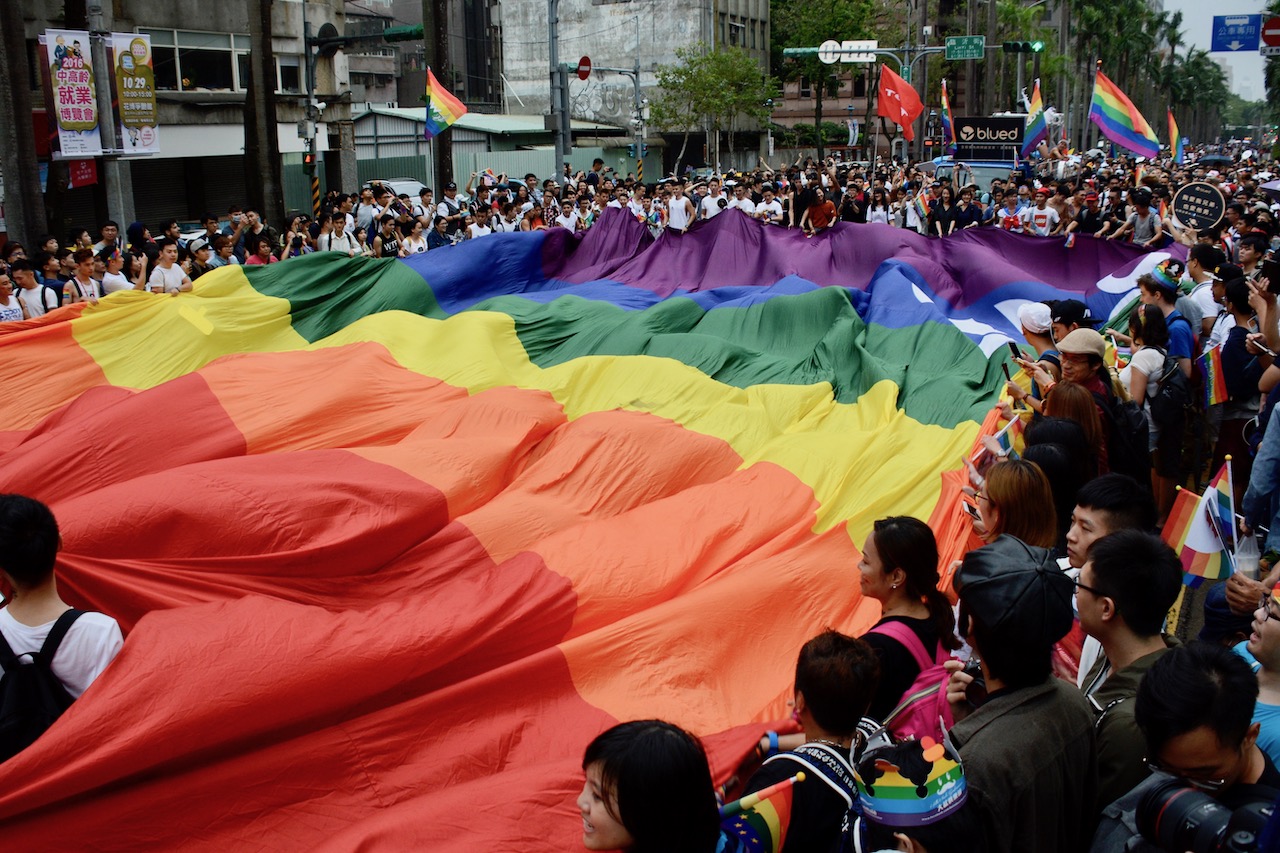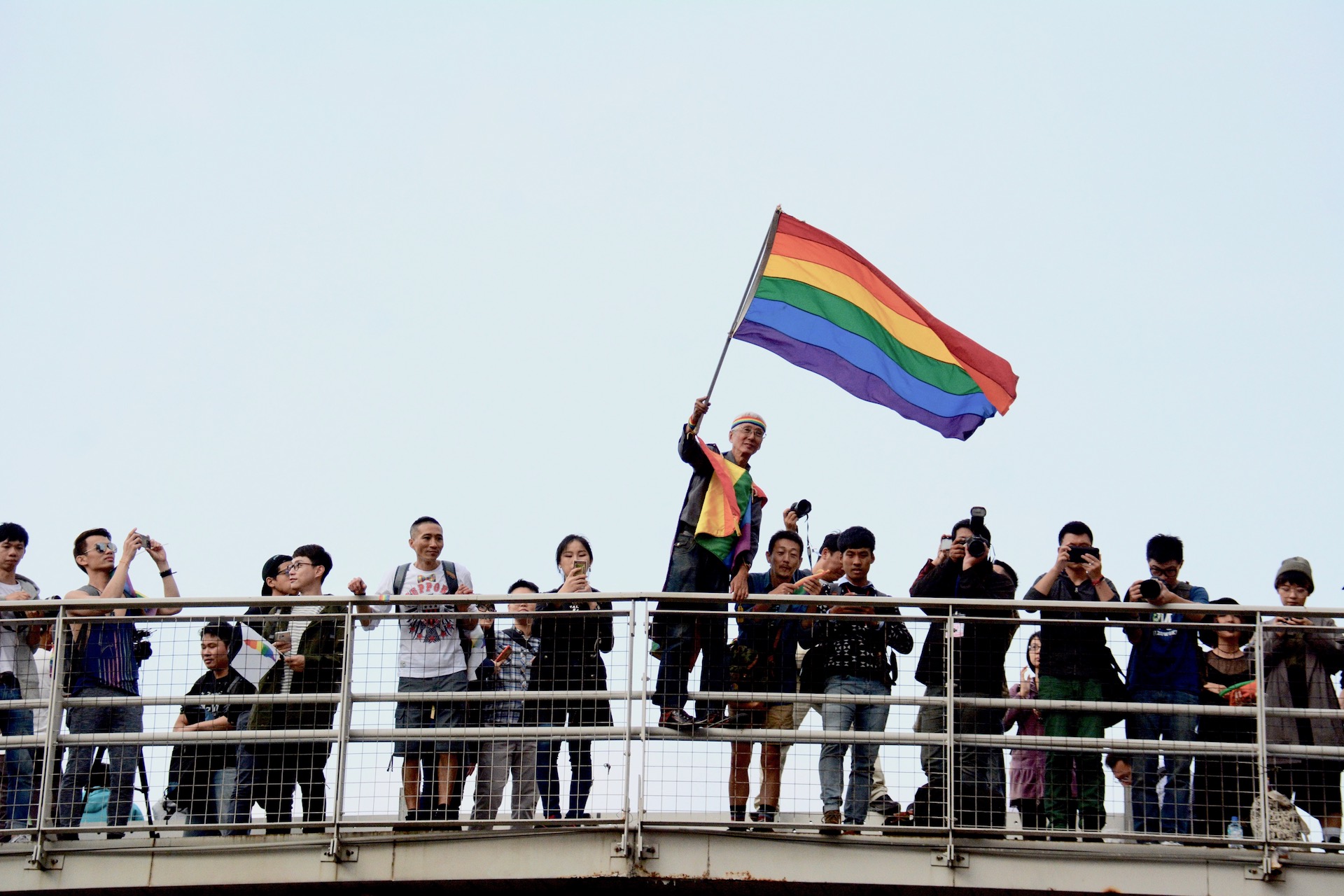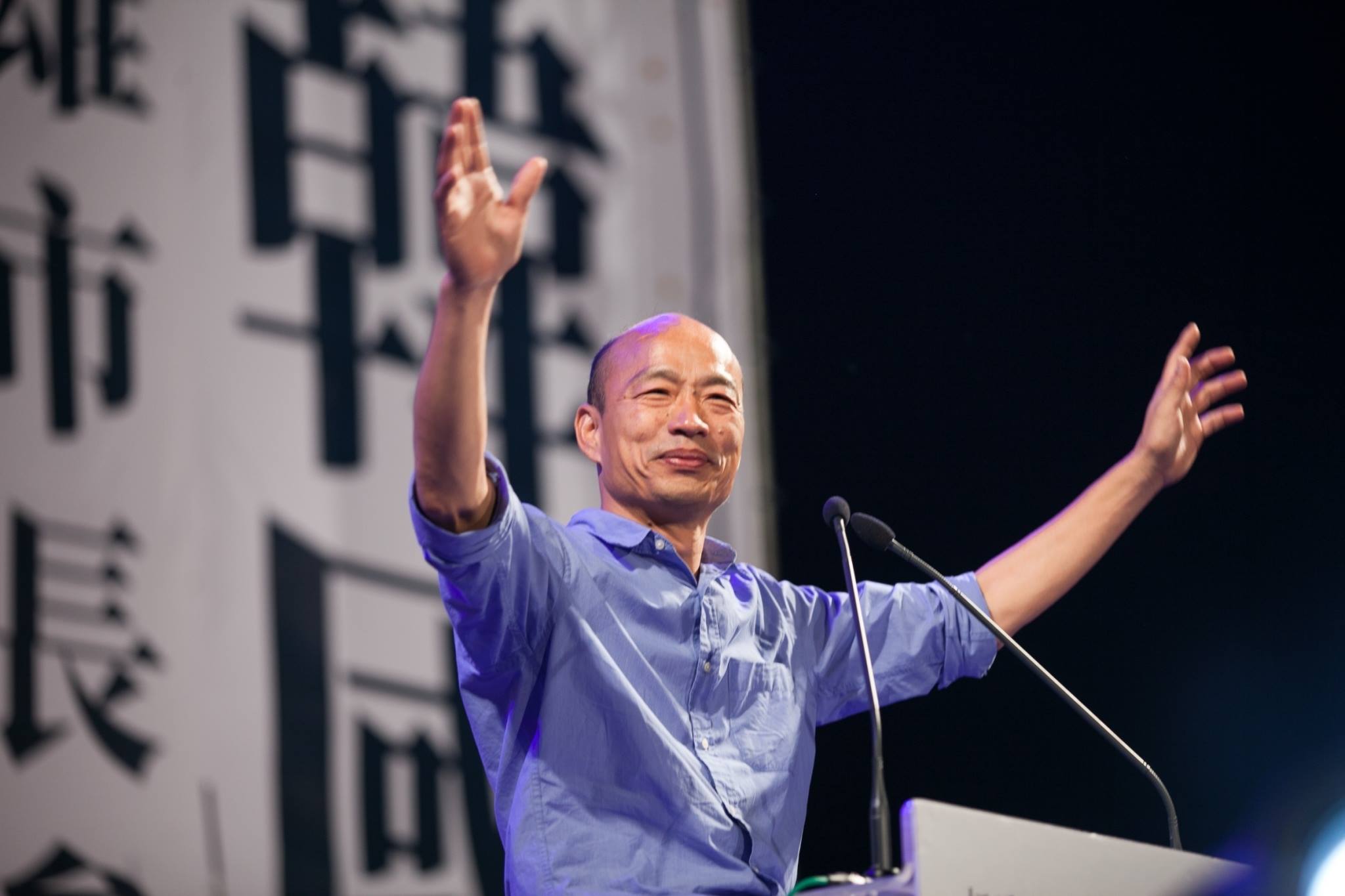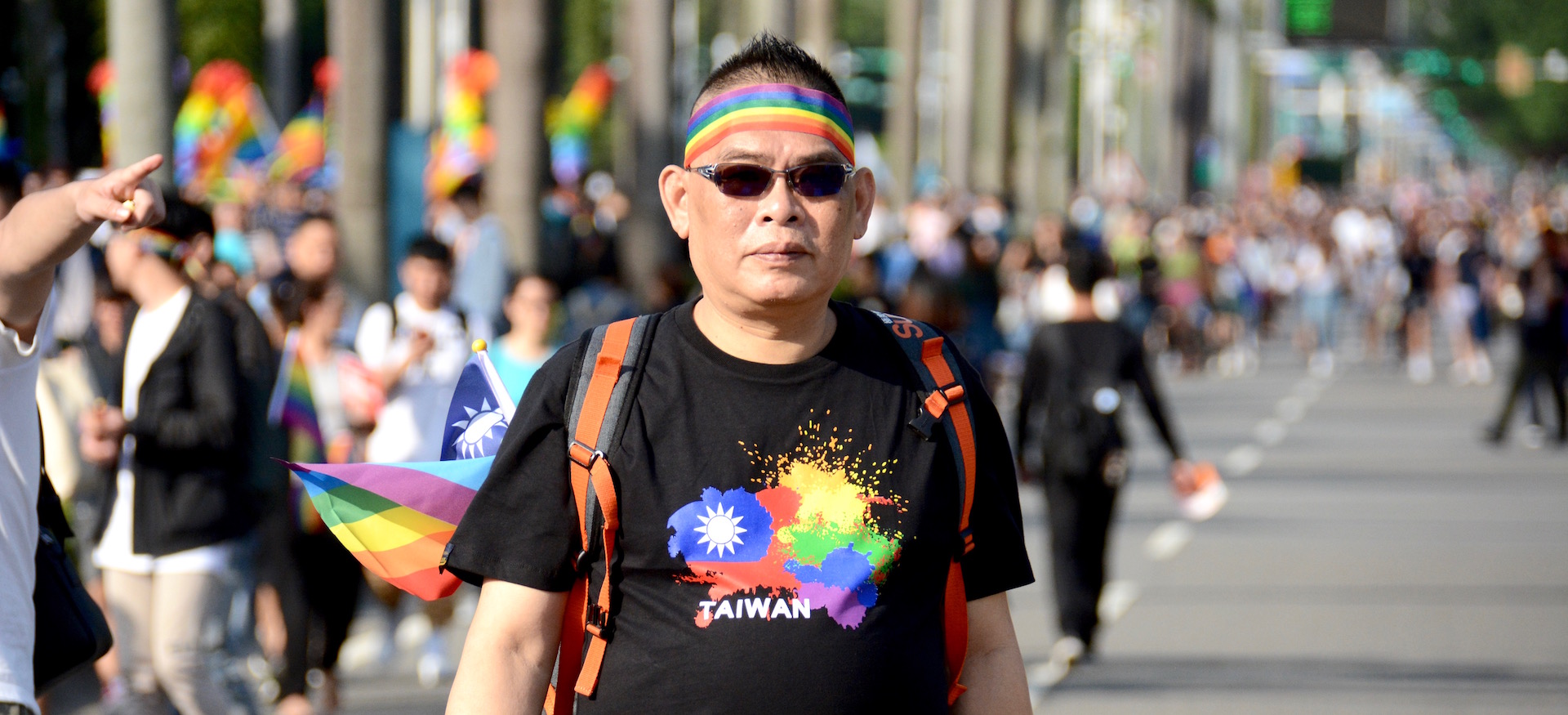LGBT rights in Taiwan and other progressive social trends in the young Asian democracy could suffer as a result of engaging the ultra-conservative Trump administration.
Over the course of the past few months, people from either side of the fence have rallied in front of the Presidential Office in Taipei over same-sex marriage, both for and against changes to the Civil Code, which would allow the nation’s gay citizens to marry their partner of choice and reap the associated social benefits. With both sides attracting tens of thousands to support their cause, the progression of the amendment to the law itself has been sluggish, with multiple delays hindering its movement through the legislative system despite the fact that more than 50% of lawmakers have expressed support for such an amendment.
At the same time, President-Elect Donald J. Trump’s apparent openness to direct dialogue with President Tsai Ing-wen has the potential to create a new golden era in U.S.-Taiwan relations, or at the very least a change in the status quo. However, a closer relationship with the upcoming government means a relationship with a significantly more conservative government than Taiwan has been accustomed to in almost 50 years.
If Taiwan were as equally conservative leaning as the incoming U.S. government, there would likely be no problem. However, with an ever progressive ideology being taken on by more and more people from both sides of the political spectrum in Taiwan, alarm bells should be ringing in the Tsai camp that their political agenda may be put at risk in order to secure a working relationship with the incoming Republican government. And gay marriage could easily become a pawn in this game.
Generally speaking, Taiwan should look forward to at least four years working with a Republican majority Congress and Senate, who have historically been more sympathetic to Taiwan’s needs. While President Obama is well liked in Taiwan, his “pivot” to Asia was largely stalled by conflicts in the Middle East, and the only U.S. arms sale to Taiwan during his presidency not only undermined credibility regarding Washington’s commitment to its Asian ally, but also sent a dangerous signal to China. It’s not just Obama and his administration that have not been fully amicable toward Taiwan; regarding the now infamous Trump-Tsai call, the backlash in the United States came primarily from those aligned with the Democratic Party.
In stark contrast, the previous Republican President George W. Bush stated that the U.S. would do “whatever it took” to protect Taiwan. Even if he later said he did not support Taiwan independence, if we take his words on the assumption that China launched the first strike, it sends a clear message that what was agreed under the Taiwan Relations Act more than three decades ago still held true. In 2016 the Republican Party ratified the Six Assurances — a key component of the U.S.-Taiwan relationship — at their National Convention, and overwhelmingly support the 2017 National Defense Authorization Act, which for the first time explicitly stated the potential for joint senior military exchanges. The Trump team itself has senior figures that theoretically can carry Taiwan’s interests to the ear of President Trump. Chief of Staff Reince Priebus has visited Taiwan on several occasions as part of a Republican delegation and has been described as a friend of Taiwan; head of Trump’s National Trade Council Peter Navarro once explicitly stated that the U.S. “must not dump Taiwan” and the Jim DeMint, president of the conservative Heritage Foundation, which has worked closely with Trump’s transition team, has extensive ties with Taiwan.
Theoretically, such a significantly pro-Taiwan American government should be perceived as a positive step in bilateral relations. However, if Trump is famous for anything, it is his “art of the deal,” and no doubt deal making will play an important part in his international diplomatic strategies. Although both nations’ relationship with China is likely to be strained, it is possible that a conservative government would be willing to force Taiwan’s hand on domestic policy in exchange for continued support. Given that the incoming government has both strong allegiances to the Christian Church as well as a staunch anti-LGBT viewpoint, marriage equality could be one of the issues used by the Trump government to get Taiwan to concede to its terms.
Even if Trump himself is typically murky about his own views regarding LGBT rights, an analysis of some new appointees to the House of Representatives and Trump’s cabinet makes it apparent that this is a government whose key aims is a regression in civil liberties for gay Americans. Incoming Vice President Mike Pence condones conversion therapy and funding it by cutting off HIV treatment; Trump’s pick for Attorney General, Jeff Sessions, refused to vote on expanding the definition of hate crimes to include LGBT people; Trump’s top adviser, Steve Bannon, stated that gay rights have “made America dumber,” and the incoming secretary of education, the billionaire Betsy DeVos, has repeatedly donated to anti-gay groups. Trump himself has promised to undo all of President Obama’s Executive Orders — including one that prohibits federal contractors from discriminating against LGBT people.
As devastating as this might be for LGBT minorities in the U.S., this has the potential for serious societal implications in Taiwan. Whether it be continued arms sales, planned military co-operation or even the potential for favorable tariffs on trade, Trump’s government is in a very strong position at the bargaining table to make Taiwan jump through hoops in order to maintain and improve economic and security prospects. This puts Taiwan in a precarious position where it may be under pressure to pursue a more socially conservative agenda in order to placate top U.S. conservatives. With marriage equality for LGBT citizens being one of the most obvious challenges to social conservatism, gay rights could easily end up as a casualty of improved relations.
A core Trump philosophy is international isolationism and a disdain toward traditional allies and how the U.S. has to protect them without (some claim) getting anything in return. Given the incoming government’s strong ties to Taiwan alongside its staunch anti-LGBT sentiments, there may not only be a financial cost to a continued alliance: if what we have learned of Trump’s desire to be more of a figurehead is to be believed, those charged with the day to day management of American diplomacy may see more value in non-financial gains and influence. Direct U.S. influence is not the only thing that could curtail marriage equality; indeed Taiwan also has the potential to censor itself on the issue in order to show both an openness to work with a staunchly conservative government and a signal that the Trump administration would be working with a Taiwan that has similar ideals.
Over the past 17 years, Taiwan has made remarkable strides toward becoming one of the most welcoming places in Asia for LGBT people, whether that be in the form of the annual Taipei Pride Parade, which this year attracted 80,000 people and became one of the largest in the world; or the number of laws put in place to allow for gender inclusivity and protect individuals from being discriminated against because of their sexual orientation; from the Gender Equity Education Act to the ratification by the Ministry of Health and Welfare to allow a change of gender on identity cards without first requiring reassignment surgery. From a country where, in 1985, about 95% of its citizens felt that homosexuality was fundamentally wrong, today almost 75% agree that LGBT couples should have the same rights as their heterosexual counterparts. Taiwanese should see their nation’s progressive values as one of its defining features, and neither the citizens nor its government should be willing to compromise on this.
While Taiwan can be seen as a beacon of progressive values in Asia, strong conservative (often Christian) voices have consistently stood against marriage equality. Although those who identify as Christians in Taiwan account for little more than 5% of the population, their influence has affected a much larger group of people, and they have an especially strong connection to those in power. Many of these Churches have links to evangelical churches in the U.S., such as the International House of Prayer and Bread of Life, both of which celebrated Trump’s victory and have their roots in Evangelicalism. Some of them are among the staunchest Republican voters in the U.S. Empowered by the rise of American nationalism and conservative values, they may be able to use their influence with Taiwanese lawmakers to block efforts to amend the civil code. Trump is a wholly unpredictable character, but for sure the man who promised to turn the tide on American civil freedoms and liberties has the potential to do the same in Taiwan.
You might also like
More from Society & Culture
Media and Free Expression in Taiwan Are Under Attack: What Can be Done?
How can we avoid the imposition of a blanket silence which can only empower our enemies and damage our democracy? …
What Makes the Nation?
What sets Taiwan apart, and what gives it its value, is what it stands for — its national narrative, the …
An Appeal to Reason (and Love) on 11/24
On Saturday, Taiwanese must use their precious vote to cast the devil of unreason, of lies and maliciousness into the …









